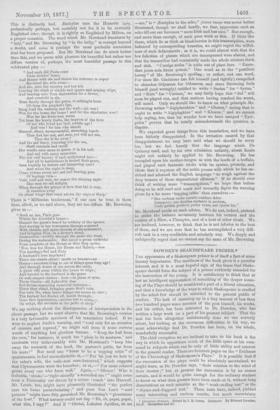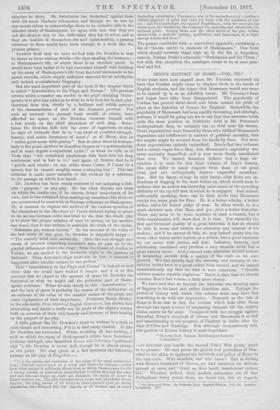DOWDEN'S SHAKESPEARE PRIMER.* THx appearance of a Shakespeare primer is
of itself a fact of some literary importance. The smallness of the book gives it a peculiar interest, and it is a most hopeful sign of the times that Shake- speare should form the subject of a primer evidently intended for the instruction of the young. It is satisfactory to think that at last an intelligent appreciation of something of the deeper mean- ing of the Plays should be considered a part of a liberal education, and that a knowledge of the ways in which Shakespeare is studied by the select few should be unfolded to the general public of readers. The task of summing-up in a tiny manual of less than two hundred pages some account of the poet himself, his works, and his critics, has been entrusted to Dr. Dowden, who has written a largo work on a part of his present subject. That the task has been altogether satisfactorily done we can scarcely admit, but looking at the enormous difficulties in his way, we must acknowledge that Dr. Dowden has been, on the whole, wonderfully successful.
The chief exception wo are inclined to take to his book is the way in which he apportions much of the little space at his com- mand to subjects which can be only of little utility and interest to the general reader. There are fourteen pages on the " Evidence of the Chronology of Shakespeare's Plays." It is possible that if the succession of the plays could be absolutely ascertained, we might learn, as Dr. Dowden says, "their relation to tho mind of their creator ;" but at present the succession is by no means certain, and it would be quite enough for the ordinary student to know on what data guesses have been made at it, without long dissertations on such minutiae as the " weak-ending test" or the " rhyme-and-doggerel test." These testa have, indeed, yielded many interesting and curious results, but much uncertainty * Literature Primers. 1.11ted by J. B. (keen. diwikapare. Dr Edward Dowden, LL.D. Ilaemillan and Co,
attaches to them. Mr. Swinburne has declaimed against them with his usual Pindaric vehemence, and though we do not by any means refuse to acknowledge them to be valuable aids to the minutes study of Shakespeare, we agree with him that they are not the obvious key to the difficulties they try to solve, and as they are besides in themselves dry and uninteresting, a passing reference to them would have been enough, in a book like the present primer.
Another fault that we have to find with Dr. Dowden is that he states as facts various details—the deer-stealing, for instance— in Shakespeare's life, of which there is no absolute proof. It would have been better if he had contented himself with building up the story of Shakespeare's life from the brief statements in the parish records, which supply sufficient material for an intelligible and, indeed, a satisfactory biography.
But the most important part of the book is the chapter which is called " Introduction to the Plays and Poems." The greatest service which a teacher can render to the pupil studying Shake- speare, is to give him a hint as to what he is to look for in each play. Gervinus does this, chiefly by a brilliant and subtle account
of the characteristics of each of the dramatis personee. For such an account the present book would, of course, have afforded no space, so Dr. Dowden contents himself with
a few words on the chief characters of each play. Some- times Dr. Dowden falls into the error of vagueness, as when he says of Orlando that he is " an ideal of youthful strength, beauty, and noble innocence of heart ;" or of Bison, that he " unites good-sense with genius." But at other times he is singu- larly to the point, as when he describes Jaques as "a sentimentalist, and in some degree a superficial cynic ;" or when he tells us of Viola that "her occasional playfulness falls back into her deep tenderness and is lost in it ;" and again, of Brutus, that he is "gentle and tender ; he can strike down Omar, if Cam be a tyrant, but he cannot roughly rouse a sleeping boy." This last criticism is made more valuable to the student by a reference to the passage on which it is based.
Dr. Dowden has been wisely cautious in not assigning a defi- nite " purpose " to any play. He has often thrown out hints on which the reader can, if ho choose, found conjectures of his own, but he has refrained from making any assertions like those we
are accustomed to meet with in German criticisms on Shakespeare. He is content to explain the motives of the various speeches of the characters in the Merchant of Venice without trying to prove to us, as one German critic has tried to do, that the whole play is to show the proper relation of man to money, or (as another
has done) that it was written to establish the truth of the motto, " Summum jus, summa injuria." In his account of the value of the last scene of this play, Dr. Dowden is singularly happy :- " The comedy must end mirthfully. After the real struggle and strain of interest respecting Antonio's fate, we pass on to the playful differences about the rings ; from the Court of Justice at Venice, we are carried to the luminous night in the gardens of Belmont. Even Antonio's ships must not be lost ; a moment of happiness after trouble cannot be too perfect." This "Introduction to the Plays and Poems " is indeed so well done that we could have wished it longer, and it is on this account that we object to the amount of space Dr. Dowden has bestowed on what we might call the polemical part of Shake- speare criticism. What we miss chiefly in this "Introduction"— and the lack of space is probably the reason of the deficiency—is an estimate of the value of the smaller scenes of the plays, and
some explanation of their importance. Professor Henry Morley, in his admirable First Sketch of English Literature, has shown how
interesting and useful a study can be made of the slighter scenes, both on account of their own beauty and because of their bearing on the purport of the play. A little primer like Dr. Dowden's must be written in a style at once simple and interesting, if it is to find many readers. In this Dr. Dowden has succeeded. While avoiding all fine-writing, a rock on which too many of Shakespeare's critics have foundered
(witness Schlegel, who described Romeo and .1 ulict as a " perfumed sigh "), Dr. Dowden is never dull, though he is almost always to the point. We may quote as a fair specimen the following passage on the play of King John:— " It is the shame and weakness of the reign of the royal malefactor, John—himself represented as a weak and dastardly usurper—rather than what makes it politically illustrious, on which Shakespeare dwells. A strong breath of patriotism nevertheless breathes through the play, and this fills and buoys up, amid all disasters, the spirit of Cceur de Lion's bastard son. The play contains three large and splendidly drawn figures ; the king, basest of all kings in Shakespeare's eyes, no strong malefactor, like Richard III., but capable of all treason and of every
degrading submission; Constance, who is the embodiment of a mother's violent passions of grief and love, yet weak with the weakness of her sex ; and Faulconbridge, the typical Englishman, with his courage, his tenderness, his frankness, his contempt for unreality and affectation, his national pride. Among these and the other forces of the play Arthur moves with a pathetic beauty, gentleness, and innocence, as a lamb among wolves and lions,"
The primer concludes with a convenient appendix, containing a list of "books useful to students of Shakespeare." One book which should certainly stand high up in the list is forgotten, namely, Nathan Drake's admirable " Shakespeare and his Times ;" but with this exception the catalogue seems to be at once prac-
tical and full. •







































 Previous page
Previous page